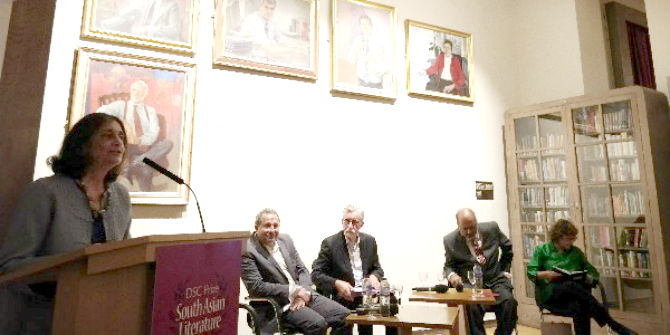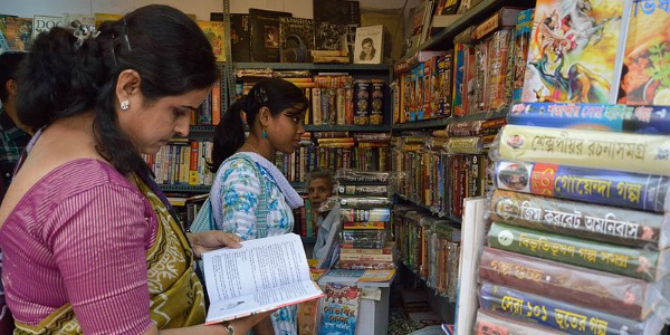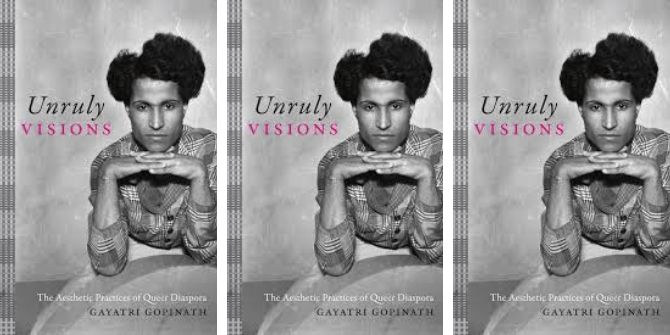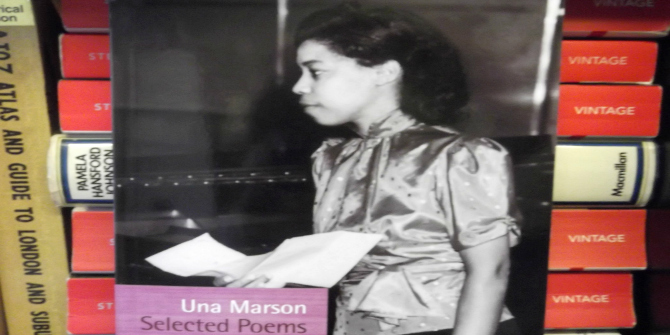In November 2017, the shortlist for the DSC literature prize for South Asian Literature was announced at the LSE. Ritu Menon, co-founder of feminist press Kali for Women and one of the judges of the prize, spoke to Rebecca Bowers, co-editor of the South Asia@LSE blog, about the decline of the feminist press in the West, and the challenges facing women in publishing today.
This interview was originally published on the South Asia@LSE blog. It is being reposted to coincide with the LSE RB blog March 2018 endeavour, ‘A Month of Our Own: Amplifying Women’s Voices on LSE Review of Books’. If you would like to contribute to the project in this month or beyond, please contact us at Lsereviewofbooks@lse.ac.uk.
Rebecca Bowers: As chairwoman of the judging panel for the DSC literature prize, what in your view makes an award-winning publication? What are the ‘secret ingredients’?
Ritu Menon: I think as part of the jury and speaking on behalf of the jury, what we were looking for and I think what we have found is exceptional literary quality, confidence and maturity in the writing, skill, good craft and very compelling stories. I think if you can get that combination then you have very commendable writing, so that’s what I think we have found in the shortlist and as to the winner, well, that will be decided later.
RB: Although female authors are now rightfully coming to the forefront of the literary world, what challenges would you say that they still face today?
RM: I wish that I could say they are coming to the forefront but I’m not sure that they are. They are being published a little more. A little more. They are somewhat better represented as far as reviews go, as far as reception in the market goes, and I suppose as far as a certain degree of visibility is concerned, but I think if one were to look at their representation in awards, they’re still woefully slim. So I’m not sure that they are in the forefront. They are definitely present, but there is a way to go. The very fact that we speak of women writers when we don’t speak of men writers, it makes them other than the norm.
RB: That’s very true. In fact, with that in mind, what do you believe can be done to make literature more inclusive not only in terms of authorship, but also in terms of readership as well?
RM: Well you see, I think there are several aspects to this. There is a literary establishment worldwide which is male-dominated – I think the power hierarchy is pretty clear. You will find in most of the publishing houses especially in the [global] North – I’m speaking of the West and the North in distinction to the [global] South – the decision-making is in the hands of the male. The publicity and the marketing and the PR is usually in the domain of women. Yes, they are present in editorial, but editorial these days is subordinate to finance and marketing. So the fact that the entire trade market of the publishing industry is still predominantly in the hands of men, means that there has to be a very concerted effort to shift that balance and perhaps to make … and I’m speaking now with the large corporate houses, the smaller independent presses may have a few more women because they function very differently: they have a rather different hierarchy of priorities; they have a rather different economic agenda; they have a different literary agenda quite often, and so it’s a little less, shall we say, predictable in that sense.
As far as readership is concerned in that sense, I’m with a feminist press, and obviously we were told when we first started that there’s no such thing as a reader for our books. Well, we thought half of the world was a fairly large number of readers, and indeed there is a growing readership and there has been a loyal and supportive and reliable readership as far as, let’s say, feminist publishing is concerned. As far as women’s presses were concerned. As far as women writers and readers, and indeed, some of the visibility women now have as readers and as writers, but especially as writers, is because of this groundwork. Because of making visible what was an invisible segment. Not that it was non-existent but it was invisible. So, I would say there is a readership, that readership is sympathetic and supportive, but it’s not to say that the market is more receptive. The market is made up of both, as you know. So of course it would help if there was more critical attention, if they weren’t ignored, if they weren’t dismissed, if there was an active engagement with what they write, if they were not relegated to the domestic and if there was serious attention paid to their experience.
RB: After establishing Kali for Women and Women Unlimited, and obviously we now have Zubaan Books, what would you say the future holds for feminist presses in South Asia?
RM: Well, I would say actually that there are probably better prospects in South Asia than in the North. In the West, there are no feminist presses now, I mean there are less than a handful. So, to the extent that we are still independent and autonomous, we are a little more in control, shall we say. But the prospects for its development or its growth I think are difficult. It’s still a struggle: I think if we were to start today, rather than as we did over 30 years ago, we would find it much more difficult to sustain our activity than we did when we began, and the reason for that was, you know, the feminist presses were not only a part of the women’s movement but what used to be called the women in print movement. And the women in print movement was made up of, of course of publishers, but also reviewers, librarians, book sellers, designers, printers, binders and a whole support group of an international network, that provided not just solidarity but support. And I certainly think that if it hadn’t been for those feminist presses across Europe, the UK, North America, Australia, we wouldn’t have had the same kind of experience that we did, so with the sort of disappearance of those presses, obviously it’s not the same environment within which we are working. So, the prospects are, as you can imagine, difficult.
RB: As an author yourself, you’ve written a lot of literature involving activists’ views and opinions. How might the relationship between activism and literature be better utilised today?
RM: It’s actually quite well utilised. We publish a lot of activist material and that material goes very far, you know, I’m speaking of let’s say pamphlets, and, you know, what used to be called ephemeral material. Posters, diaries, postcards, things that never enter the retail trade at all, but they’re used and disseminated widely by another kind of user who are the groups who are working directly on the ground with large numbers of women. Now that, I’m not sure that we would say that’s a link between activist material and literature, but it is certainly a link between activism and the material we produce, which is part of our overall objective. I mean it’s an essential part of women’s overall experience, so its link with the literary, with the academic, with the non-fiction, with the fiction, is direct. It’s not always evident, but it’s there. Because it’s one end of the spectrum, and that’s at the other end. So I don’t see these as being other than part of a continuum, and so the link is reinforced, I think, with each book that is published. It doesn’t matter which genre it’s in, because it is reflective and reinforces the others that are produced.
This interview gives the views of the authors, and not the position of the South Asia @ LSE blog, the LSE Review of Books blog nor of the London School of Economics.
Image One Credit: Ritu Menon speaking at the shortlist announcement of the DSC literature prize, London School of Economics (Mahima A. Jain).
Image Two Credit: Women browse the selection at Bankim book stall during the 39th Kolkata Book Fair (Biswarup Ganguly CC BY 3.0).










Since my graduation days, Kali for women has been a constant companion. Such a beautiful read and a book I can always return to. I have been thinking of pursuing my studies in social anthorpology and I came across a read on Indian Feminist Art and I loved it. So thought of sharing it.